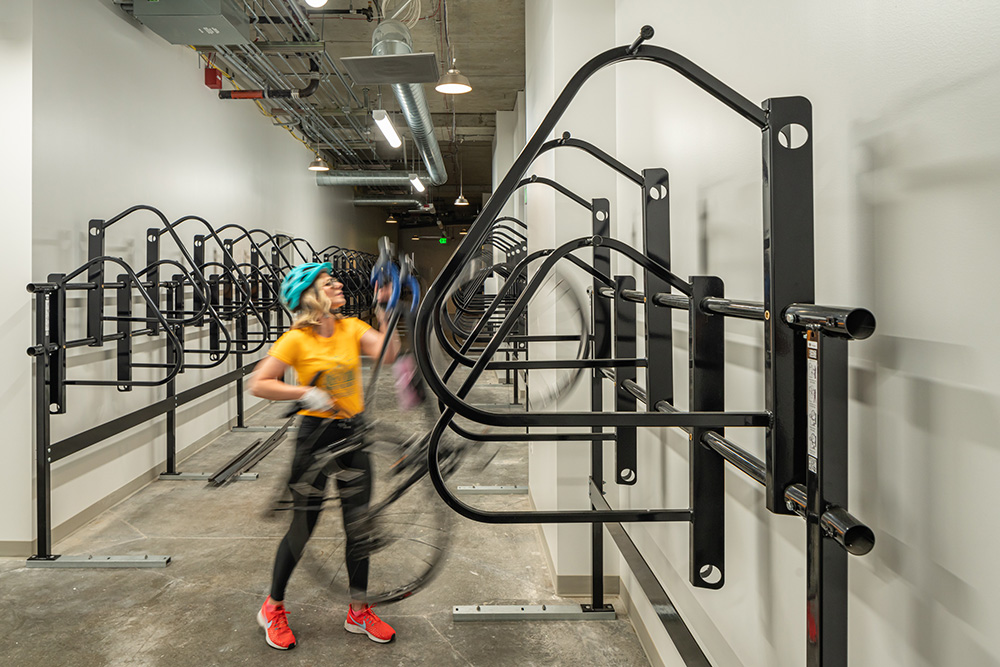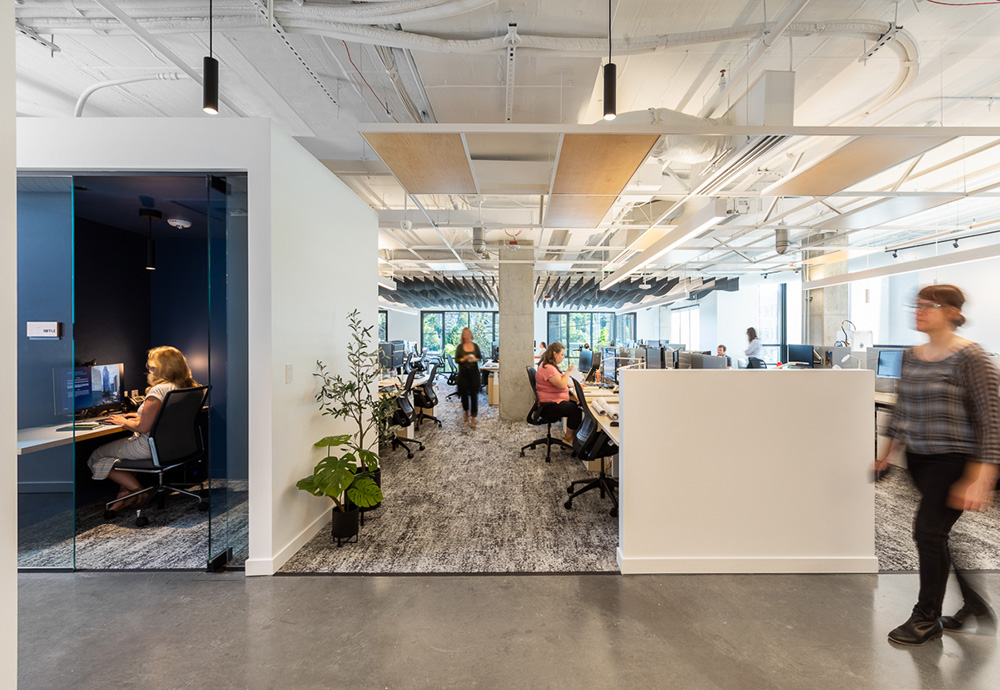By Nicole Winn
Nicole is a Principal and FitWel ambassador. Her belief that good design comes from a solidified work method combined with continuing education led her to become part of Weber Thompson’s first wave of LEED APs and a member of the team that originated Weber Thompson’s sustainable design initiatives.
Since 1949, the United States has recognized May as Mental Health Awareness month. For the past two years, the pandemic and its subsequent disruptions to our lives has brought an increased understanding of the need to recognize, prioritize, and normalize talking about mental health in both homes and workplaces.
As employees return to offices everywhere, considerations about how the work environment supports mental health is increasingly important to worker satisfaction and workplace productivity. In his 2019 Forbes article, Elements of an Effective Workplace Mental Health Strategy, Garen Staglin suggests a “culture of care” as a long term goal for workplaces that requires them to prioritize their employee’s mental health. This culture of care can be achieved through personnel initiatives, training, and education for leadership. There are also physical-spatial elements to be considered: workplace design and environment can have mental health benefits. There are many definitions of health (i.e. social, physical and community), all of which are inextricable with mental health; recognition of this fundamental relationship is key for a supportive work environment.
The Fitwel certification platform recognizes this broad spectrum of health within the built environment at a variety of scales from a single office space to campuses and communities. Organizations committed to prioritizing mental health can benefit from Fitwel due to its attention to wellness and the structure it provides. As a tool for companies, it provides evidence-based strategies and resources that can contribute to a healthy environment. Weber Thompson employed many strategies from the Fitwel program when designing its new space in the Watershed building, in Seattle’s Fremont neighborhood. The building ultimately received the highest (3-star) certification by Fitwel in early 2022. All seven Fitwel health impact categories can have influence on an individual’s mental health. We outline some of the themes below.
Proximity to outdoor spaces that encourage physical exercise
It is well documented that exercise improves creativity, cognitive function, and energy while reducing stress and anxiety. Weber Thompson received credits at Watershed for providing a workplace in a setting that is walkable, has access to nature and community amenities such as walking trails and playing fields. The building itself encourages bicycle commuting with interior amenities including secure bike storage, locker rooms, and showers.

The building encourages bicycle commuting with interior amenities including secure bike storage, locker rooms, and showers.
Nature walks have long been touted as restorative for mental health. In the article “Nurtured by nature,” Kirsten Weir provides three exciting theories for this restorative process, the first is a biophilia hypothesis that suggests humans’ innate connection to nature; the second is that humans experience stress reduction as a physiological response; and the third is that exposure to natural settings is restorative to cognition—increasing one’s ability to think better.
At Watershed, Weber Thompson employees are fortunate to have access to nature walks on the Burke Gilman path just steps outside our door. Through the work of our landscape architects, we’ve improved these walks with our award-winning Swales project that diverts and cleans millions of gallons of polluted water through lush planted areas. These walks have infiltrated our practice in other ways, too: weather permitting, we sometimes hold walking meetings in lieu of sitting in a conference room.
Flexible Workspaces
The pandemic has redefined the idea of how and where we work for the foreseeable future. Employees are returning in person with their individual experiences of remote work along with a wide range of challenges and preferences for their immediate environment. It is clear that employees desire flexibility in both scheduling and workspaces. Fitwel recognizes the health benefits of such workplace flexibility. It allocates credits for providing active workstations for sitting or standing, and providing break areas, multi-purpose rooms, and rooms dedicated to nursing mothers. Weber Thompson received Fitwel credits for all of these amenities at Watershed.

Individual focus rooms are available for staff looking for acoustic privacy and quiet.
In addition, our new offices include a variety of spaces for staff, such as individual focus rooms for acoustic privacy and quiet, an isolated fabrication lab that allows for noisemaking in the creative and building process, and a number of small work areas including window benches with tables and bar seating in the kitchen. These spaces are available whenever someone needs a change of venue.
Iterative Feedback Loops
To develop and maintain a culture of care, open dialogue between leadership and staff is crucial. Fitwel provides credit for conducting occupant satisfaction surveys and for collaborating with stakeholders to identify the health missions for the office (physical and programmatic). Further, it provides additional credits for incorporating the findings of the surveys and stakeholder discussions into workplace action plans. Fitwell requirements can be a complement to other forms of community engagement for firms committed to advancing social justice, community health, and equity. For example, Weber Thompson leveraged the Fitwel occupant satisfaction survey in our participation in the corporate transparency project known as Just. This label identifies those firms that have missions that include corporate transparency, social justice and equity; such transparency is foundational to good intrafirm communication and trust—and a culture of care.
A Call to Action
As the saying goes, we are in unprecedented times. Beyond platitudes, it is time for workplace organizations to act. Fitwel is a recognized, easy-to-use, accessible platform that can bring focus and implementation to good intentions. Certifications such as Fitwel can help to change workplace environments to enhance a culture of care and improve employee mental health, satisfaction, and ultimately productivity.
